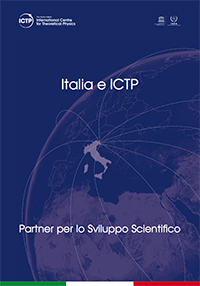I - 34151 Trieste Italy
(+39) 040 2240 111
pio@ictp.it

ICTP would not be where it is today without the enduring support of the Government of Italy. The country's investment in ICTP has ensured that scientists in developing countries are given unique educational and research opportunities in many areas of basic and applied sciences, including theoretical physics, mathematics, Earth system physics, and quantitative life sciences. Through ICTP, Italian funding--together with support from the UN agencies UNESCO and the IAEA--has benefitted more than 140,000 scientists throughout the developing world who have attended conferences and workshops, formed research collaborations, pursued doctoral degrees, and maintained connections with ICTP's world-wide network of top scientists.
One example of ICTP's support of science in the developing world is its long tradition of scientific capacity building in Africa. Over the last few decades, ICTP has supported numerous activities throughout the continent, including training programs, networks, and the establishment of affiliate centres. ICTP's Trieste campus has welcomed more than 10,000 African visitors since 1970, providing advanced research and training opportunities unavailable to scientists in their home countries.
 |
| ICTP and Italy brochure (pdf, in Italian) |
The benefits of the ICTP-Italy partnership are also felt closer to home. The Centre maintains close ties with some of Italy's top research institutes, such as the Istituto Nazionale di Fisica Nucleare and the Consiglio Nazionale per la Ricerche, as well as with the "Trieste System" of scientific institutions, encouraging collaborations with its in-house, international staff of scientists. On a broader scale, ICTP works with a network of about 400 Italian laboratories to place scientists from developing countries who are looking for advanced scientific training in a laboratory setting. Over the years, this Training and Research in Italian Laboratories program has benefitted hundreds of developing-world scientists, boosting their research careers through collaboration with world-class scientists using the latest equipment, and exposing them to Italian culture as well.
ICTP has established several joint master's and doctoral programs with Italian universities to expand educational opportunities for developing world scientists, especially with its Trieste neighbours the International School for Advanced Studies (SISSA) and the University of Trieste. The most recent academic collaboration with SISSA has resulted in a master's program in High Performance Computing (HPC) centred around the institutes' shared HPC facility, one of the largest in Italy. ICTP also hosts Italian post-doctoral students, providing them the chance not only to work with top scientists in their field but also to experience ICTP's dynamic, international environment.
Several international policy forums and events organised by ICTP--including the G8-UNESCO World Forum on 'Education, Research and Innovation: New Partnership for Sustainable Development' in 2007 and the Centre's recent 50th Anniversary celebrations--have highlighted Italy's important role as a country dedicated to the strengthening of science in the developing world through its partnership with ICTP.
Underscoring ICTP's half-century of achievements, Italy's President Giorgio Napolitano said in a message presented at the Centre's 50th Anniversary celebration, "I am sure that, in celebrating this important stage, the centre will know to look to the past as an example to build further success, continuing to promote, in the footsteps of the Nobel laureate Abdus Salam, more and more and more effective international cooperation, as an irreplaceable instrument of development."